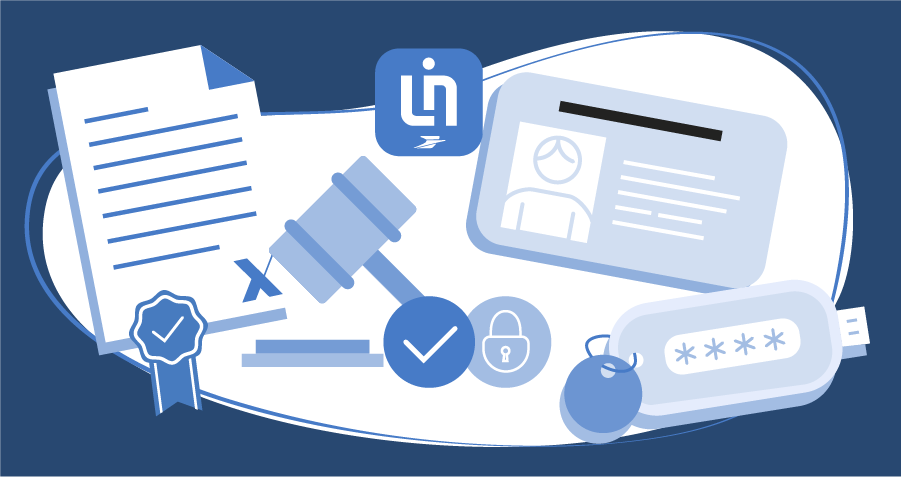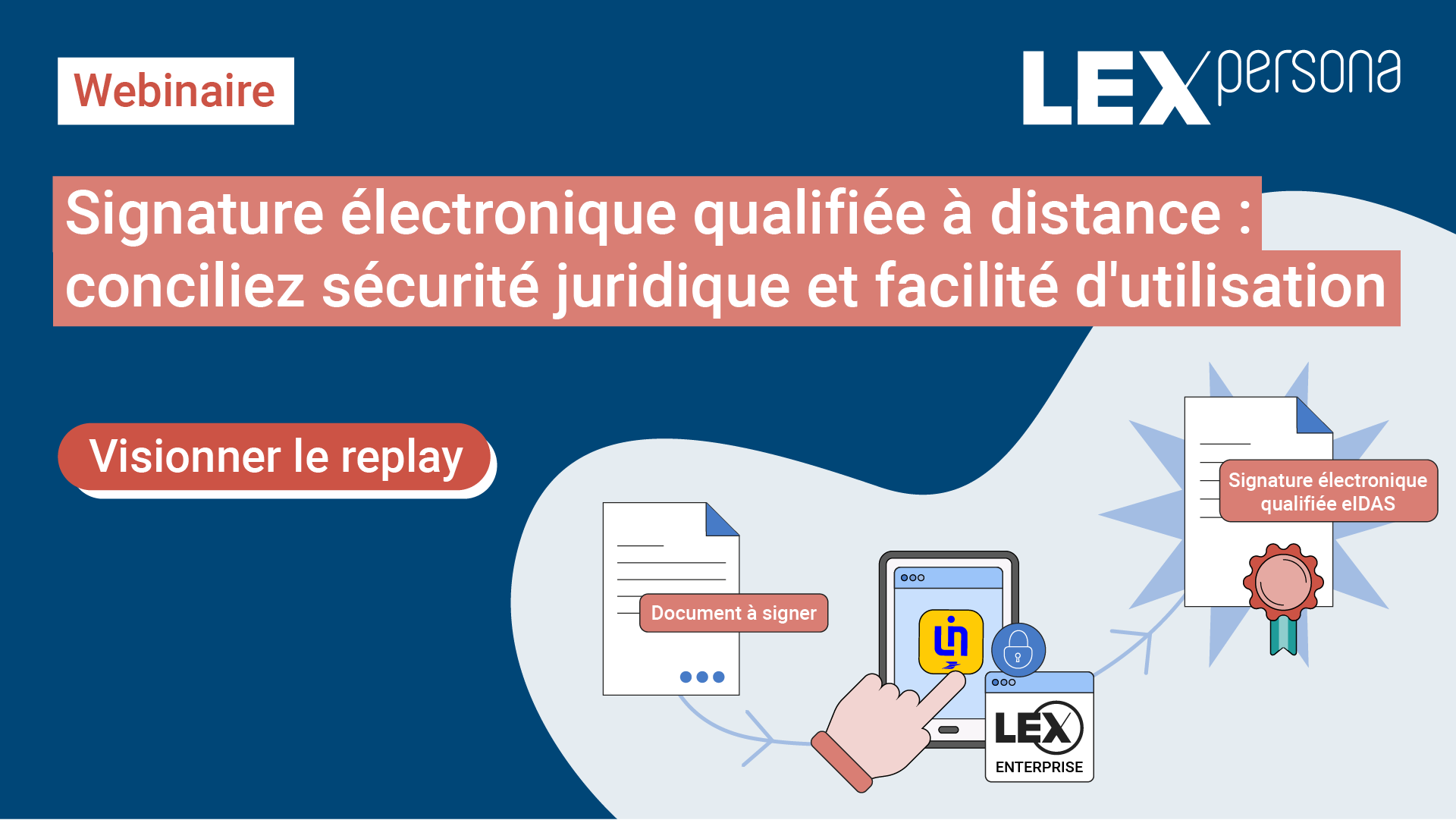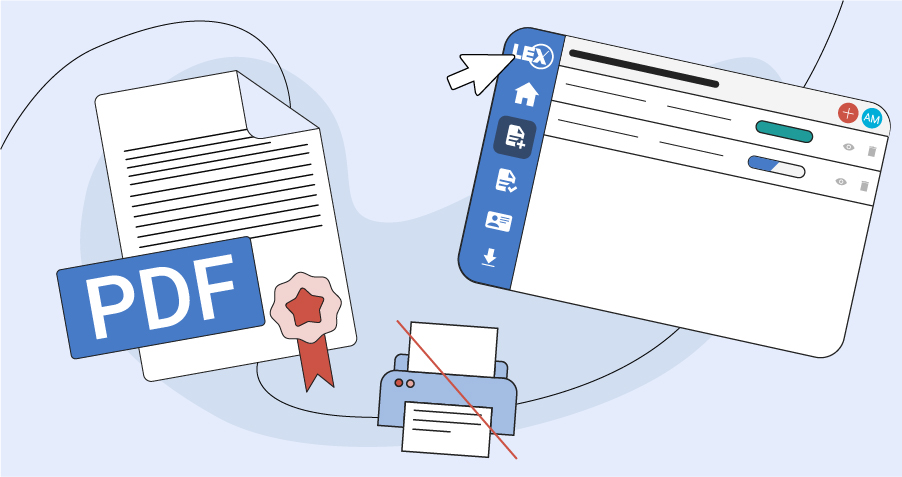Share on :
In an increasingly digital world, the dematerialization of transactions has become inevitable. In this context, accelerated by the rise of telecommuting, many administrative or commercial documents are signed remotely. Although sometimes a source of apprehension, electronic signatures can speed up contractual processes, improve the customer experience and increase efficiency and speed, even for the most sensitive transactions... provided you choose the right level of signature.
Qualified electronic signatures meet precisely this requirement for legal certainty. So how is the qualified electronic signature regulated, particularly within the European Union? Why choose it? How can you facilitate the implementation of a qualified electronic signature process in your company?
After a quick, but essential, reminder of the definition and regulatory context, we answer your questions in this article.
eIDAS Regulation: the European legal framework for electronic signatures
Understanding the eIDAS regulation
- Electronic identification ;
- The electronic signature ;
- Trusted services ;
- The electronic signature generated remotely from a qualified;
- Website authentication certificates ;
- Issuance of electronic attribute certificates ;
- Electronic archiving services ;
- Electronic registers.
The 3 levels of electronic signatures formalized by the eIDAS regulation-
Electronic signatures can be used for a variety of purposes, depending on the company and its business needs: employment contracts for human resources, customer contracts and quotations for the sales department, accounting documents for the finance department, and so on.
It guarantees the identity of the signatory and the integrity of the document, but its legal value depends on the level of signature. The eIDAS regulation distinguishes three types of signature:
- simple electronic signature This corresponds to the most basic stage, in which no distinction is made between different signature methods, provided that the signatory uses them to sign in the normal way. It is used for documents with low regulatory and financial implications. low (internal company documents, low-value orders, etc.).
- advanced electronic signature Advanced electronic signature: used for documents with moderate regulatory constraints and financial stakes and financial issues (employment contracts, sales agreements, etc.), it offers a higher level of confidence.
- Qualified electronic signature: the highest level of security. The only one to offer the same legal value as a handwritten signature, it can be used to securely sign documents with high regulatory and financial implications (life insurance contracts, public procurement contracts, etc.).
Please note!
A 4th level of electronic signature has been defined specifically for public services. This is an advanced electronic signature based on a qualified electronic signature certificate .
--
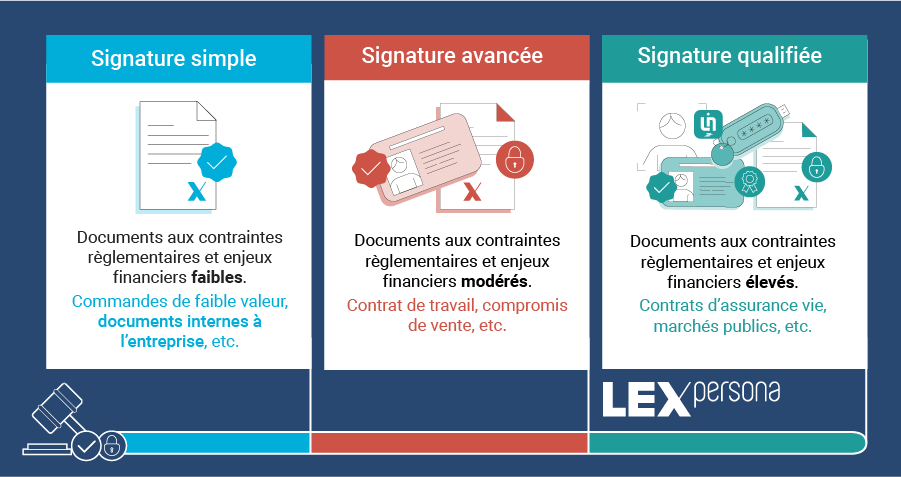
-
What is a qualified electronic signature?
Defined byarticle 3 - 12 of the eIDAS regulation, the qualified electronic signature is the 3rd level of electronic signature and the only one legally equivalent to the handwritten signature in all European countries.
What is the definition of a qualified electronic signature?
A qualified electronic signature is an advanced electronic signature based on a qualified electronic signature certificate (to guarantee the identity of the signatory and its link with the certificate's public key) and created using a qualified electronic signature creation device (to guarantee the integrity and confidentiality of the private key associated with the certificate's public key).
It therefore requires a qualified certificate issued by a trusted service provider and a QSCD (Qualified electronic Signature Creation Deviceoften combining software and a certified hardware element - smart card, authentication key or cryptographic equipment).
As the most most technically and legally robust signatureit guarantees :
- the authenticity of the signatory's identity ;
- the integrity of the signed document;
- non-repudiation of the signed document.
When should a qualified electronic signature be used?
Qualified electronic signatures must be recognized throughout the EU. It offers optimal security and maximum legal compliance . Qualified electronic signatures are generally reserved for sensitive transactions :
- authentic instruments or notarial deeds ;
- trade agreements ;
- responding to calls for tender and awarding public contracts ;
- contractual exchanges with foreign countries, particularly within the EU, etc.
To determine the right signature level for your situation, there are several questions to consider:
- What is the scope of the document (internal or external, national, European or international, etc.)?
- What type of document (private contract, administrative decision, etc.)?
- What are the regulatory constraints constraints?
- What is the the risk of conflict and what would be the consequences ?
The higher the risk and severity of a dispute, the more advisable it is to choose a signature with a high probative value, such as a qualified electronic signature.
What are the security advantages of qualified electronic signatures?
The qualified electronic signature is the only one to offer :
- the same legal value and enforceability and enforceability of a handwritten signature ;
- a indisputable legal validity recognized in all EU member states;
- l'reversal of the burden of proof (presumption of reliability in the event of litigation);
- demanding technical criteria (i.e. a reinforced security base) requiring face-to-face verification of the signatory's identity and the use of a secure key.
-
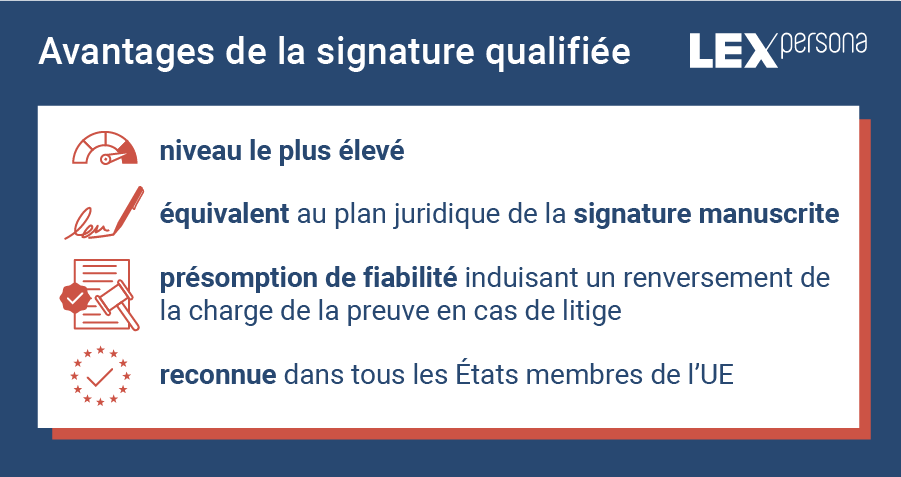
-
Lex Entreprise's qualified electronic signature: no longer having to choose between ease of use and legal certainty
As an expert in the field of eIDAS electronic signatures, Lex Persona develops solutions that make it easy to sign, have signed and sealed any document, in full compliance with regulations. With Lex Entreprise, electronic signature solution, the 3 types of signature provided for by the eIDAS regulation are easily implemented... Even the qualified electronic signature, reputed to be complex and costly!
How does Lex Entreprise facilitate the qualified electronic signature process?
Lex Entreprise simplifies the qualified electronic signature process, from certificate creation to electronic signature management. It offers a eIDAS-compliant solution compliant solution based on two modes :
- Local" mode The signatory has a qualified eIDAS Certificate based on a qualified electronic signature creation device. This is usually a smart card or USB token. To create a qualified electronic signature, Lex Enterprise uses the Odisia Desktop component (PKCS#11 and MSCAPI protocols).
- Mode " Server" mode The signatory does not possess a qualified certificate. Lex Enterprise's integrated Certification Authority (Sunnystamp Natural Persons CA) generates a real-time certificate compliant with the ETSI EN 319 411-2 standard at QCP-n-qscd level, based on an eIDAS means of identification at substantial or high face-to-face level.
Since August 2023, La Poste group's " Identité Numérique La Poste " application can be used as a means of electronic identification for qualified electronic signatures. This application enables signatories to carry out qualified remote signatures in compliance with the eIDAS regulation.
Qualified remote electronic signatures from Lex Entreprise
Opting for a qualified electronic signature can be complex and costly. That's why Lex Entreprise has developed France's first sovereign remote eIDAS qualified electronic signature solution. It benefits from highest level of legal security and unprecedented ease of use.
The qualified remote signature developed by Lex Enterprise today relies on authentication authentication based on the Identité Numérique La Poste.
This authentication makes it possible to issue the signatory with an "on-the-fly" qualified certificate, with eIDAS qualification level QCP-n-qscd, which indicates that the private key associated with the signatory's certificate is stored by a qualified electronic signature creation device.
-
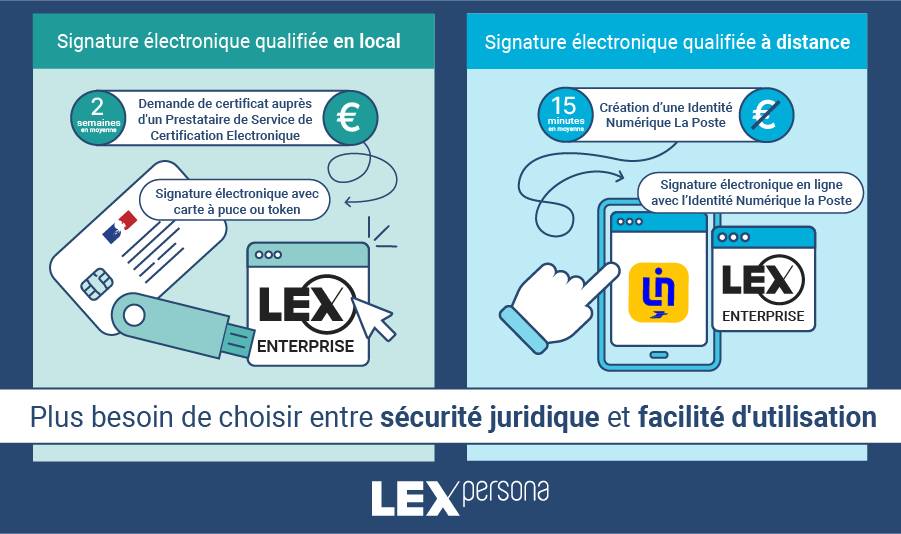
-
The advantages of Lex Entreprise for your qualified electronic signature
When security stakes are high, setting up a process can seem complex. But it doesn't! Lex Entreprise's qualified electronic signature solution qualified electronic signature solution doesn't force you to choose between legal security and ease of use. On the contrary, the electronic signature platform is fully customizable and easily configurable. It offers numerous advantages in terms of use, including :
- A simplified integration into existing processes thanks to a powerful, well-documented API, making it easy tointegrate signature paths into business applications;
- Centralization and monitoring of a contract's entire life cycle, from conception to signature and archiving;
- The customization of validation and signature paths, for a wide range of uses (human resources, purchasing, training, legal, etc.);
- The guarantee of a user experience, thanks to its ergonomic design and tailored functionalities: customization of the dashboard for an electronic signature experience adapted to the specific needs of the signatory and the business sector;
- The optimal management of responsibilities and improved document verificationA complete traceability of the signature process.
- Guaranteed compliance with high security standards: ETSI EN 319 411-2 QCP-n-qscd qualification, ISO 27001 and HDS certification, eIDAS EN 319 421 qualified time-stamping.
And of course, every Lex Entreprise signature (simple, advanced or qualified) complies in every respect with the specifications defined by the eIDAS regulation.
Don't let the signing process slow you down. Choose Lex Entreprise and discover a more efficient and secure way of concluding your agreements online. Would you like to integrate one of our solutions, or simply find out more? Our experts are here to help.
